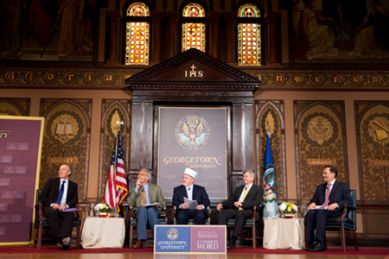'Common Deeds' Tops Agenda for 'Common Word' Conference

Putting words into action was a theme voiced by several Christian and Muslim leaders at the fourth annual Common Word Conference held last week at Georgetown University.
"It has been both the challenge and the hope for this conference that common words would lead to common deeds," said the Rev. Mark S. Hanson, presiding bishop of the Evangelical Lutheran Church in America. . "We have heard stories of places where particular Muslims and Christians are deepening their understanding of one another in dialogue that leads to engagement in their communities."
Hanson and several others addressed nearly 1,000 participants at the Oct. 7-8 conference, which featured speakers such as British Prime Minister Tony Blair; Professor Ingrid Mattson, President of the Islamic Society of North America; Patriarch of Jerusalem Theofilos III; and Archbishop of Nigeria Josiah Idowu-Fearon.
Jordanian Prince Ghazi bin Muhammed said in his speech that the purpose of the conference was, "to examine and chart out some concrete, practical, and, more importantly, actionable ideas that we can bring to fruition based perhaps on the principles of 'A Common Word' and the Two Greatest Commandments."
"In other words, we want to move, God willing, from 'traction' to 'trickledown', and we want to start this here, in the fourth major conference on 'A Common Word,'" he said.
"That is not to say, of course, that nothing practical has been done up to now, but our efforts, though we hope they be pleasing to God, have not succeeded enough."
Tony Blair, who became a Catholic months after stepping down from his 10-year term as Britain's Prime Minister, asked the group, "How do we make our relations, so fraught in the past, fruitful in the future?"
"First, we need to understand each other, learn about our roots, how and why we are as we are, learn the essential spirituality, peacefulness and goodness of the others' faith," he said. "This means we educate each other about each other."
Second on the list, Blair said, is, "we need to respect each other. ... One reason why peace between Israel and Palestine matters so much is: that it is a test, not just of conflict resolution but of even-handedness and respect."
"Third, we must act," he concluded. "Our relationship with each other ... will best be judged in action, in the work we can do together in relieving poverty, fighting injustice, preventing disease and bringing hope to those in despair."
In 2008, Blair established the Tony Blair Faith Foundation to promote interfaith respect and public awareness. This year, Blair launched an educational counterpart to the Foundation with the Faith and Globalization Initiative. Blair also serves as the official envoy to the Middle East on behalf of the U.S., the United Nations, Russia and the European Union.